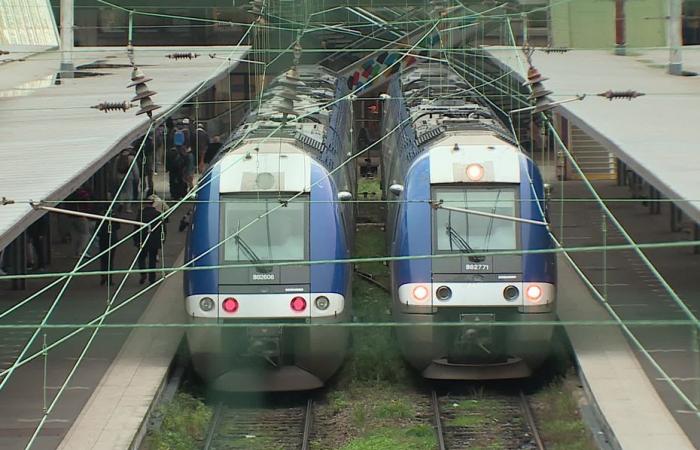
Since Sunday, certain TER lines departing from Amiens station have been operated by a new private subsidiary of the SNCF. A development which is taking place as part of the opening of rail to competition. The railway workers of this structure were on strike to denounce a deterioration in their working conditions and security risks.
The essentials of the day: our exclusive selection
Every day, our editorial team reserves the best regional news for you. A selection just for you, to stay in touch with your regions.
France Télévisions uses your email address to send you the newsletter “The essentials of the day: our exclusive selection”. You can unsubscribe at any time via the link at the bottom of this newsletter. Our privacy policy
This Thursday, December 17, only two TER trains out of five were running from Amiens. A strike movement which began on Sunday December 15 to denounce the privatization of the “Etoile d’Amiens”, a set of TER lines open to competition and now operated by a private subsidiary of the SNCF. To the detriment of the safety of travelers and the working conditions of railway workers, according to the SNCF unions.
In question, the new job descriptions which contain additional obligations, in particular for train drivers who must carry out a switching maneuver. Although the strike ended at the end of the afternoon, the demands continue, negotiations are beginning and the unions do not rule out resuming the movement at the start of 2025, if necessary.
To enter and exit their track at Amiens station, drivers would have to get off the train and maneuver the switch to direct their train towards the track in which it can travel. For the moment, this maneuver is carried out by “detachers”, agents specialized in operating trains at times when they are not carrying passengers.
“We are not safe from an accident, from a safety error where it will lead to a train derailmentfears Éric Espinouse, train driver assigned to the new private subsidiary. We are adding an additional mental load to the drivers, this is not possible. We already have the safety of travelers, of circulation with the authorization of movement. Adding the load to the needles creates an additional safety risk. In view of the days, the longer and longer amplitudes, it’s impossible.“
For the train driver, this privatization of the TER lines was accompanied by a change in timetable: he works the same number of hours, but over wider time slots. “Daily life is more difficult to live with, we spend more time at work, less with family“, he laments. The new management initially had other demands that the unions managed to dismiss, notably having the drivers fill up the train with diesel.”Just with gloves and glasses, then we should have continued the working day like that, smelling of fuel“, underlines Éric Espinouse.
This requirement has therefore been abandoned, Éric Espinouse hopes that it will now be the same with the movement of the needle. He emphasizes that this maneuver is very physical and requires getting out of the train. The employees who provide it are equipped and trained, not the drivers.
He and his colleagues therefore led a strike until the evening of December 17, with the support of several rail unions, including the CGT. “What we are asking of the SNCF group is to guarantee the rights of railway workers and to protect its employees with the same guarantees as what we know today.explains Angélina Darras, general secretary of the CGT federal sector of Picardy railway workers. We refuse to see our working conditions deteriorate. Opening up to competition is a political decision; however, it must be useful to users, but not to the detriment of railway workers. It is believed that opening up to competition is not good for anyone.“
The new SNCF subsidiary, however, promises, thanks to this privatization, fewer delays and more trains. If the frequency of certain lines must indeed be increased, for the delays, Angélina Darras is skeptical. “We would all like to have the trains running on time and not have any cancellations, but this is due to a lack of resources, personnel, and investment in infrastructure.“, underlines the trade unionist. And according to her, privatization will not change this lack of resources: “opening to competition necessarily implies cost restrictions. These costs are on the backs of railway workers and their working conditions.“
The trade unionist shares the fears of her fellow driver. “We accumulate tasks that were not ours at the start, because we have very specific jobs. Today these degraded conditions for everyone endanger security. We don’t want to scare anyone, but we warn, saying that the safety of users and agents must be the priority.“, warns Angélina Darras.
Even for an informed public, the evolution is a little complicated to understand. Since December 2020, passenger transport on the French rail network has been open to competition. Before that, this was the case for freight and international connections. This new development concerns long distances, high-speed lines, but also medium-distance connections such as TER.
It is the Hauts-de-France region which finances and organizes the TER offer, but it is the SNCF Voyageurs which is responsible for operating these lines. Relations between the region and the SNCF have been tumultuous for several years. As part of opening up to competition, the region is therefore publishing a call for tenders for the operation of TER lines, divided into small entities, like here “l’Etoile d’Amiens”, a set of TER lines serving Picardy.
This call for tender was won by “SNCF Voyageurs Étoile d’Amiens”, a subsidiary of the SNCF Voyageurs company. A sort of small independent SME within the huge SNCF group, which brings together five companies, including the parent company SNCF Voyageurs, as well as Keolis and Geodis. Since 2020, SNCF has been a public limited company which brings together these different entities in a somewhat indigestible mille-feuille.
The unions’ fear is that by creating small local subsidiaries to operate the TER networks, the SNCF will succeed in destroying the collective agreements in force in the group. This is what the addition of new tasks to the job descriptions of Amiens train drivers seems to suggest. The situation of employees should become clearer in the coming months, with the progress of union negotiations.
For Angélina Darras and her fellow strikers, this restructuring is a new attack on the public service that the SNCF once embodied. “This is the heart of the debate: do we want a public service for all or do we want small SMEs which are multiplying throughout the territory, particularly in Hauts-de-France where we will have four distinct entities? If the regional council decided to open up to competition so quickly, it is to undermine the status of railway workers“, concludes the CGT representative.
The SNCF Voyageurs Étoile d’Amiens did not wish to comment on this strike movement. It ended on the evening of December 17, when negotiations between management and the unions were to begin. If they do not succeed, the unions are ready to relaunch the movement at the start of 2025.
With Mary Sohier / FTV





